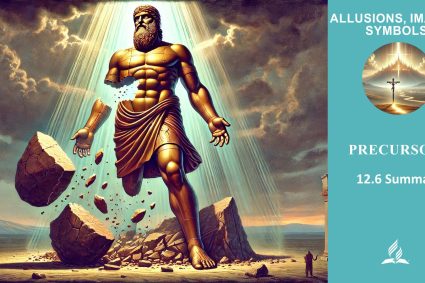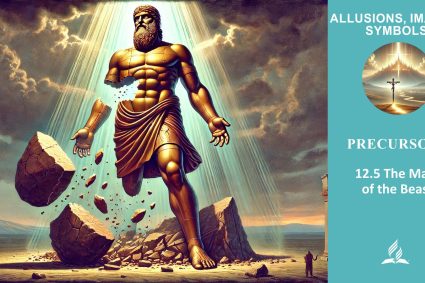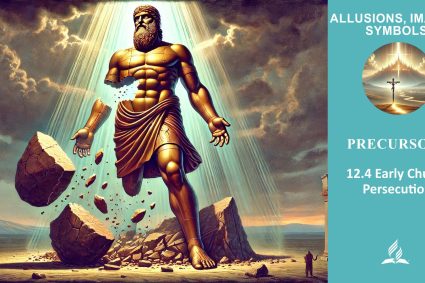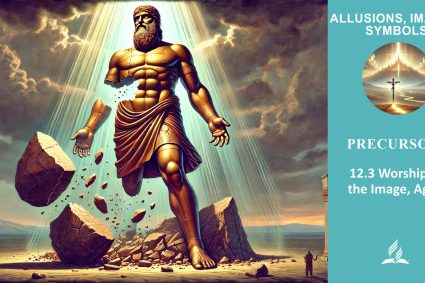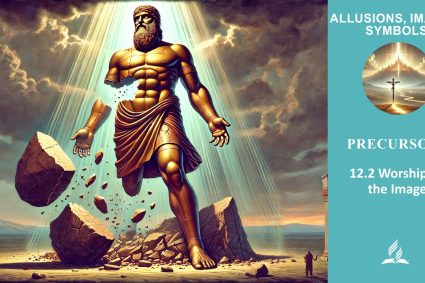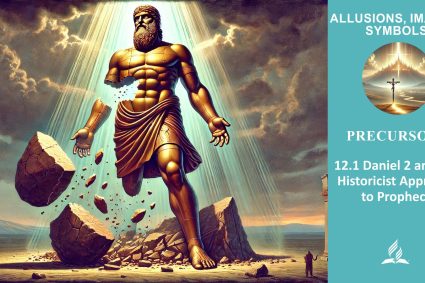


4.6 Summary
Steadfastness and Hope: The Legacy of Faith in Times of Persecution and Darkness
The fourth lesson focuses on the deep spiritual resilience and determination of the Waldensians and reformers during times of persecution and uncertainty.
Starting with “Persecuted, Yet Victorious” (4.1), the courageous steadfastness and strength of faith of these historical figures are highlighted. Despite the intense persecutions they faced, they remained unwavering in their faith, seeing victory not just as a personal experience but also as a testimony for the entire community of believers.
“Light Overcomes Darkness” (4.2) emphasizes the powerful metaphor of light in darkness. Despite the challenges and the apparent triumph of darkness, these believers believed and proclaimed that the light of faith and truth always shines and ultimately triumphs. It is a call to not be discouraged by external circumstances and always seek the light of truth.
“The Courage to Remain Steadfast” (4.3) delves deeper into this theme, emphasizing the indispensable importance of perseverance in the Christian life. Through stories of persecution, torture, and sacrifice, it is shown that true strength in faith often emerges in the most challenging times. The ability to remain steadfast despite everything is portrayed as a fundamental characteristic of a true Christian.
In “The Morning Star of the Reformation” (4.4), the transformative role of the reformers in church history is illuminated. With their clear visions, relentless commitment to reforms, and firm belief in the Holy Scriptures, they laid the foundations for a renewal of the Christian faith and became symbolic figures of resistance and renewal.
Lastly, “Inspired by Hope” (4.5) underscores the power and significance of hope in the Christian life. Despite all adversities and challenges, these believers found comfort and strength in the unwavering hope of God’s promises. Their stories serve as inspiration and encouragement for all who wish to remain anchored in their faith and hope for the Eternal.

The principles and stories of the Waldensians and reformers highlighted in the lesson “Standing Up for Truth” offer deep insights and valuable applications for our modern everyday life and faith:
-
Resilience in Difficulties: In our daily lives, we are often confronted with challenges, persecutions, or injustices. The examples of the Waldensians and reformers remind us that it is possible to remain steadfast amidst difficulties. This encourages us to face our own challenges with courage and determination and not give up.
-
Search for Truth and Light: In a world often characterized by uncertainty, misinformation, and moral confusion, the principle that “light overcomes darkness” reminds us to always seek the truth and lead our lives in harmony with it. It is a reminder that faith in God and truth can give us direction and clarity in our lives.
-
Constancy and Loyalty: The importance of steadfastness in faith and life is emphasized. In a world that often seeks fleetingness and superficial relationships, we are encouraged to remain faithful to our beliefs, values, and relationships. This constancy not only strengthens our faith but also our integrity and character.
-
Hope as an Anchor: The stories of the Waldensians and reformers show that hope can be a powerful force in difficult times. In our everyday life, which is sometimes marked by disappointments, losses, or uncertainties, hope in God’s promises and the future can provide us with comfort, strength, and direction.
In summary, the stories and principles of these historical faith heroes teach us how to live with courage, constancy, the search for truth, and a deeply rooted hope in our own faith and everyday life. They serve as living examples of how faith can be translated into practical actions and life decisions, even in the most challenging circumstances.

Thought of the Day: God reveals insights gradually so that we can grasp and understand them in our own time and way, encouraging us to focus on spiritual values rather than worldly distractions.

1.What is “progressive light”? Why does God reveal truth gradually? How can these principles be applied to God’s church today?
-
Progressive Light: The concept of “progressive light” refers to the idea that God’s truth and knowledge evolve and are revealed over time. Instead of unveiling everything at once, God gradually discloses His truth so that people can grow according to their ability and willingness to understand and accept it. This principle reflects God’s care and wisdom by ensuring that people are not overwhelmed and can continuously develop and grow.
-
Why does God reveal truth gradually? There are several reasons why God reveals truth gradually:
-
Human Limitation: Our human capacity to understand and process truth is limited. By revealing His truth progressively, God allows us to grasp it better and implement it in our lives.
-
Spiritual Maturity: Depending on our spiritual maturity and understanding, we are made ready to comprehend deeper truths. Progressive light enables us to grow at our own pace.
-
Faith Development: God wants us to actively seek Him and deepen our faith through the process of learning and growing.
-
Application to God’s Church Today: Regarding God’s church today, the principle of progressive light means:
-
Openness to New Insights: The church should be open to new insights and understanding gained through study, prayer, and communion with God. It should not rely solely on traditions or entrenched interpretations but be willing to change according to evolving divine knowledge.
-
Teaching and Doctrine: It is important to regularly review the teachings and practices of the church to ensure they align with evolving divine truth. This requires constant learning, growth, and adaptation.
-
Unity in Diversity: Since people can have different understandings and interpretations, the church should foster unity in diversity. This means that different perspectives should be respected and seen as part of a larger understanding of divine truth.
In summary, the concept of progressive light means that God’s truth is dynamic, alive, and adaptable to meet the needs and understandings of people in different times and cultures. It requires us to be humble, open, and eager to learn as we continuously seek deeper knowledge and understanding of God’s will.

2.How do new discoveries of truth relate to previous truths understood by the people of God? Why should new light never contradict old light?
Relationship of New Discoveries to Previous Truths:
New discoveries of truth should not be considered a complete replacement for previous truths understood by the people of God. Instead, they should be seen as complementary and deepening the existing understanding. God often reveals His truth in different times and contexts in different ways to meet the changing needs and challenges of His people. This means that newer insights should build upon the foundations of previous truths and not replace or revoke them.
Why New Light Should Never Contradict Old Light:
-
Consistency of Divine Nature: God Himself is constant and unchanging in His nature and principles. While the way He reveals Himself may vary, His fundamental nature and character remain consistent. Therefore, new insights should align with what is already known and accepted about God and His truth.
-
Reliability and Trustworthiness: When God reveals something as truth, this truth can and should be considered reliable and trustworthy. A contradiction between old and new light could raise doubts about the consistency and reliability of God and His revelation.
-
Unity and Coherence of Faith: A contradiction between old and new light could lead to divisions and disunity within the community of faith. Unity in truth is a central principle in faith and should therefore be protected and preserved.
In summary, new light revealed by God should always be in harmony with what is already known and accepted as truth. It should be seen as an extension, clarification, or deepening of the existing understanding and should never directly contradict it. This ensures the continuity, reliability, and coherence of divine revelation and strengthens trust and unity among God’s people.

3.No matter where you live, your culture will promote values, ideas, and morals that in some way contradict the teachings of the Bible. After identifying these areas of conflict: How do you experience yourselves and how do we as a church deal with these challenges? How can we remain good citizens while not giving in to the twisted values proclaimed by our culture?
Dealing with Cultural Conflicts and Challenges:
-
Personal Reflection and Examination: It is important to regularly pause and examine our own behavior, beliefs, and decisions in the light of the Bible. Through personal reflection and prayer, we can recognize where our cultural values and beliefs diverge from the teachings of the Bible and make corresponding adjustments.
-
Education and Enlightenment: A deep understanding of the Bible and its teachings is crucial to be firmly rooted in our faith and resist the temptations emanating from the culture around us. Through regular Bible reading, study groups, and theological education, we can solidify our beliefs and guard against misleading cultural influences.
-
Community and Support: Exchanging and communing with other believers is essential to ensure mutual encouragement, support, and accountability in our faith life. Together, we can remember what we stand for and strengthen each other in difficult times.
-
Engagement in Society: As Christians, we are called to be salt and light in the world. This means that we should be actively and constructively engaged in our society to bring about positive changes and bring God’s love and truth into the world. This can be done through social engagement, community work, and active participation in public life.
How do we remain good citizens and resist twisted cultural values?
-
Biblical Principles as a Guide: By orienting ourselves towards biblical principles and remaining faithful to them, we can be good citizens contributing to the community and advocating for the common good without compromising our Christian values.
-
Critical Evaluation of Laws and Politics: It is important to critically evaluate laws, guidelines, and political decisions and ensure they align with biblical values and principles. If they do not, we should courageously advocate for changes and raise our voice.
-
Respect and Love towards All People: Even when we speak out against certain cultural values and practices, we should always show respect, love, and compassion towards all people, regardless of their background, belief, or lifestyle. We should always strive to build relationships and bridges rather than erecting barriers.
In summary, it is possible to live as Christians in the world without being shaped by the world. Through personal reflection, education, community, and active engagement in society, we can remain good citizens while staying true to our Christian beliefs. It requires determination, wisdom, and God’s help, but with His guidance and support, we can withstand the challenges of our culture and lead a life that honors God and serves people.

4.How does the letter from Jan Hus affect your current thinking? What impresses you about this letter?
Influence of Jan Hus’s Letter on Our Current Thinking and Impressive Aspects of the Letter:
-
Historical Awareness: Jan Hus’s letter reminds us of how brave and determined past generations of Christians were in defending their beliefs, even if it meant suffering persecution and hardship. This strengthens our understanding of the history of Christianity and the sacrifices many have made to preserve and pass on the faith.
-
Faith Strength and Integrity: Hus’s letter testifies to his deep conviction, courage, and integrity. He remained steadfast in his faith and was willing to face the consequences for his beliefs. This challenges us to also be steadfast in our faith and be willing to stand up for what we believe in, even if it is uncomfortable or challenging.
-
Emphasis on the Holy Scripture: In his letter, Hus emphasizes the authority and importance of the Holy Scripture. This reminds us of the central role of the Bible in our faith and encourages us to always hold fast to the truth and teachings of the Scripture and let ourselves be guided by it.
-
Relevance for Today: Although Hus’s letter comes from a different time, his message and teachings are still relevant today. He encourages us to think critically, examine our beliefs, and remain faithful, even if it means going against the tide or becoming unpopular. His example challenges us to reflect on our own thinking and actions and ensure they align with our Christian beliefs and principles.
In summary, the letter from Jan Hus impresses us with its clarity, depth, and relevance. It reminds us to seek the truth, be steadfast in our faith, and be willing to stand up for what we believe in, even if it brings challenges. It challenges us to be courageous, think critically, and let ourselves be guided by the truth of the Holy Scripture, regardless of circumstances or external pressure.
(Visited 11 times, 1 visits today)











